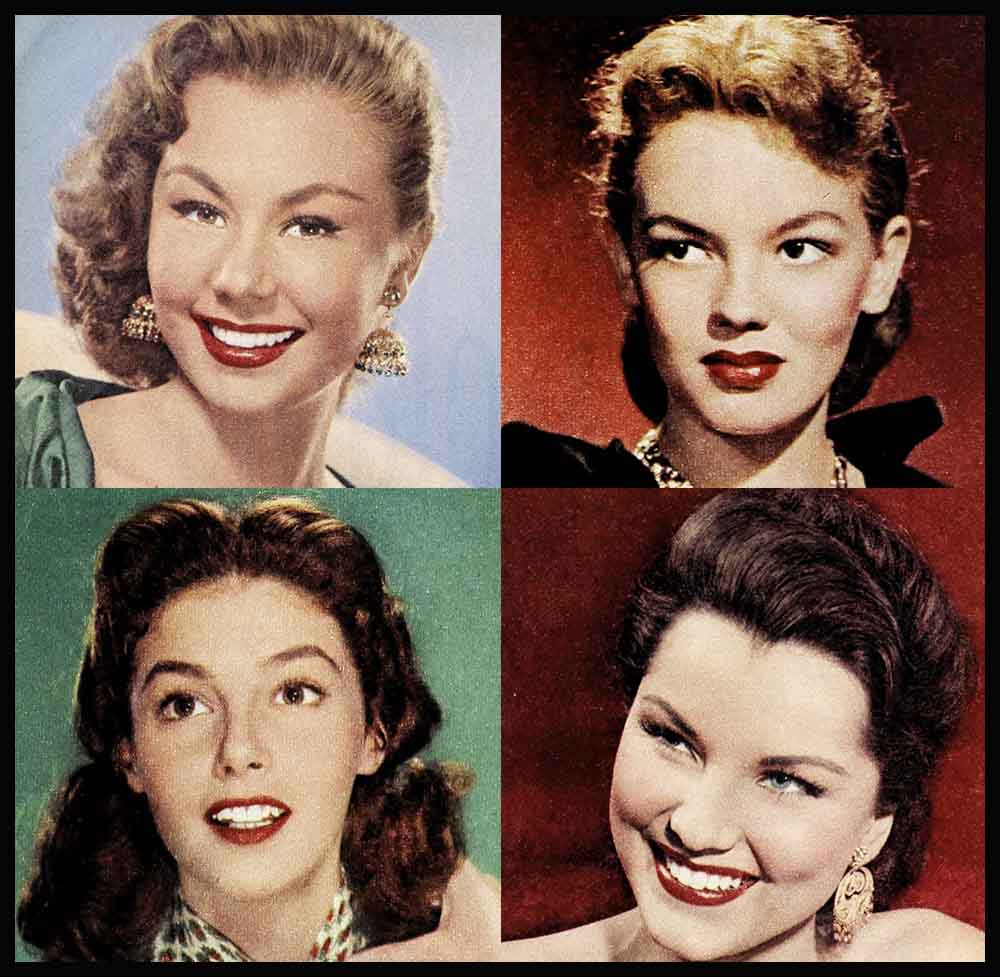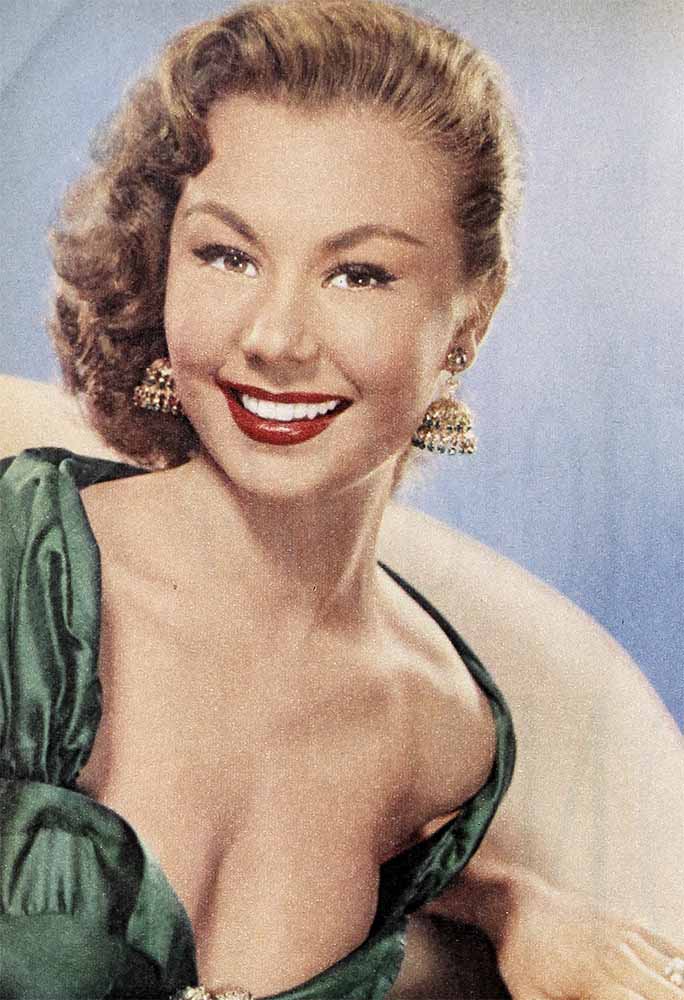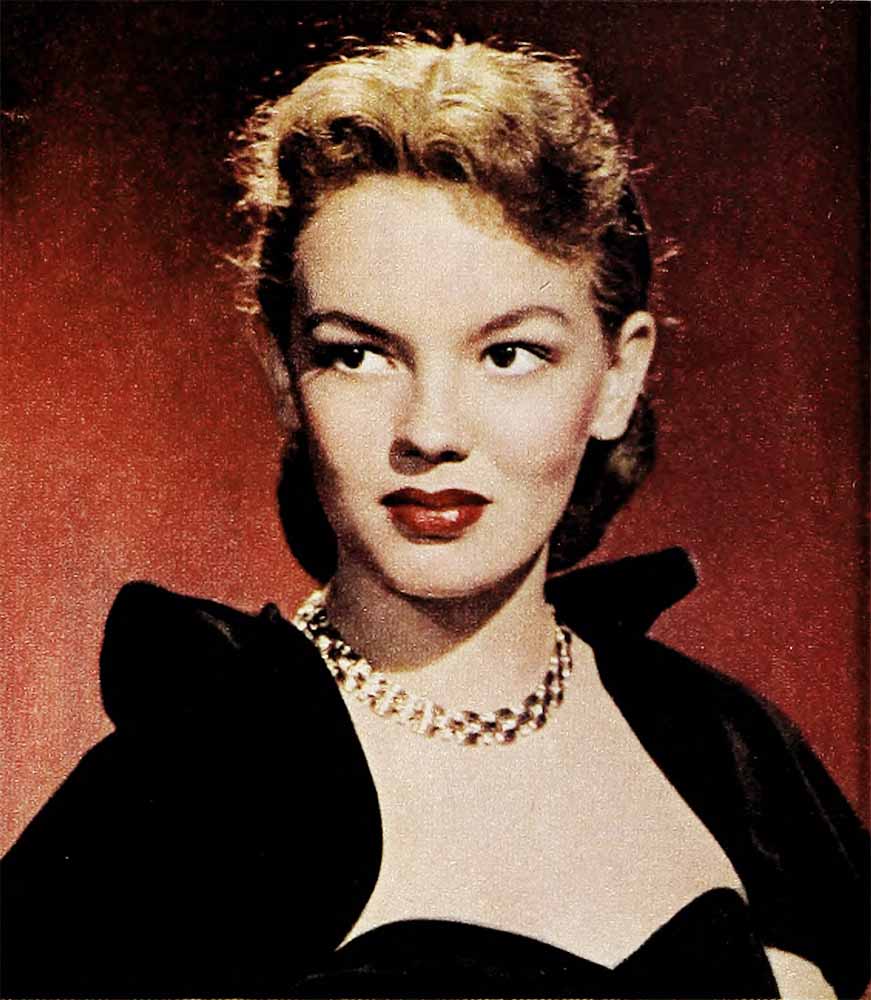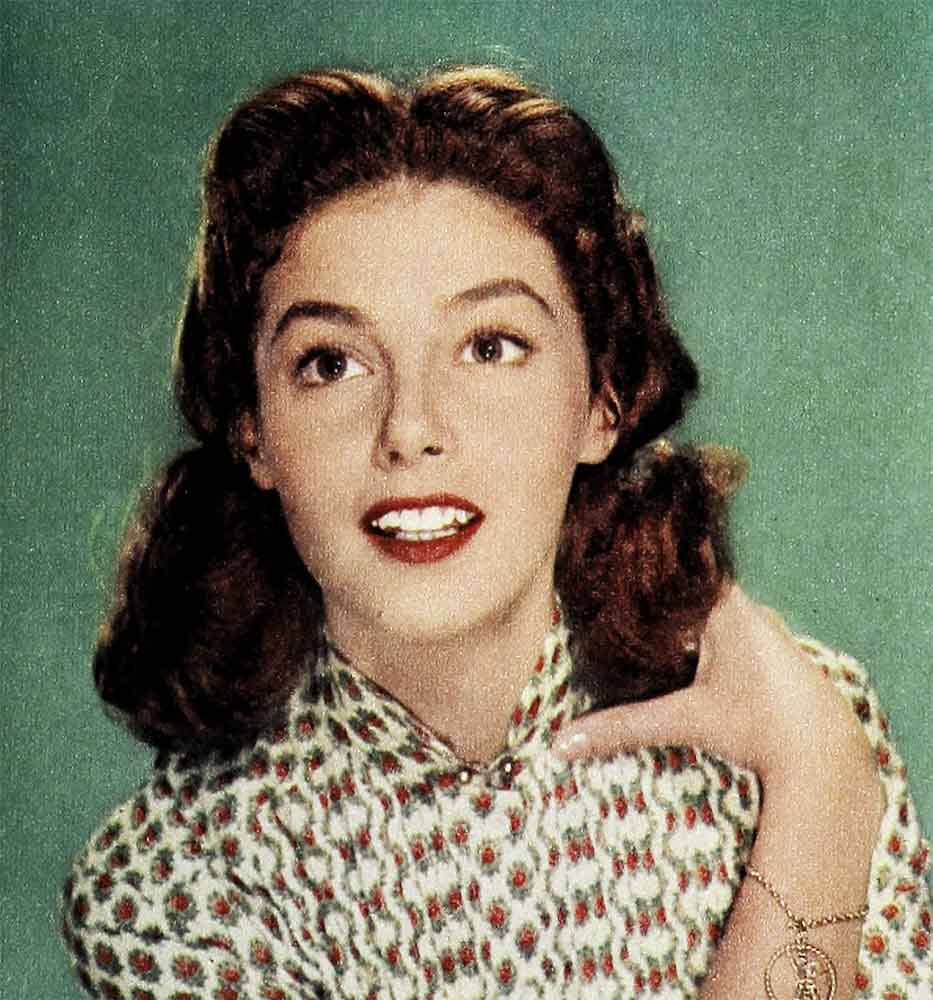
The Dangerous Years
The traditional “awkward age” is almost forgotten. You’ve watched many of the movies’ lovely teenagers go from childhood to girlhood with grace and ease. But the turning point between girlhood and womanhood brings them to a much more difficult crisis, and the way they face it determines the whole future course of their lives. These are the dangerous years, full of new stresses and impulses. Some girls shrink away from womanhood; some run too fast to meet it. Mitzi Gaynor says, “Kids in show business mature early on the outside—but inside we don’t mature emotionally to match.”
AUDIO BOOK
Unless a girl finds real emotional maturity, she can’t take on adult responsibilities, she can’t make the transitions from dating to romance to love to marriage without serious trouble. Other young stars, like Joan Evans, Debra Paget and Pier Angeli, share this problem with Mitzi. all of them became stars while still in their teens; all, therefore, acquired the outward poise that Mitzi refers to. But the appearance, as she says, can be deceptive—to the girl herself, as well as to other people. She may think she’s grown up; she may impatiently loosen family ties, only to discover that she’s too immature to handle more complicated relationships without heartbreaking mistakes.

At eighteen, Joan is the youngest of this foursome, yet the only one who has married. This isn’t so surprising when you remember her as a fourteen-year-old newcomer, already showing much more composure than the average eighteen-year-old. She explained then to this slightly over-awed writer, “I was brought up mostly with adults.” When her parents, screen writers Dale and Katherine Eunson, entertained the famous, little Joan was accepted as part of the group. “Dale and Katherine” (as Joan unaffectedly calls them) later trusted their teen-age daughter to make many of her own decisions, training her to a self-reliance that finally boomeranged against them.
No wonder Joan wasn’t convinced when her parents advised her to wait until she was twenty-one before marrying. Because she’d had such a long head start, associating with grown-ups from childhood, learning early to reason problems out for herself, she probably felt that mentally she was twenty-one, and she didn’t want to wait three years for the calendar to catch up with her reckoning. So she and Kirby Weatherly went ahead and were married, with the satisfaction of hearing parental objections turned into blessings afterwards. But this marriage is still in its first year There’s no doubt that Joan is mentally mature. Emotional maturity, however, is something else again, and it remains to be seen whether Joan is really sufficiently grown up to be a successful wife.

Mitzi Gaynor, of course, reached a totally different conclusion on the question of early marriage. There’s no one answer to suit every case; each girl must look for the one that’s right for her own situation. her own personality.
While Debra Paget is a year older than Joan, her present attitude toward romance is in sharp contrast. Dates? She can take ’em or leave ’em. She has stepped out with Bob Wagner, but if her attitude has changed a little, it’s hardly reached a pitch of enthusiasm.
Here’s a significant fact: Unlike Joan, who is an only child, Debra’s the middle child among five. Raised in this big, companionable household, she always had playmates at hand. Show business is the family trade, and each child gravitated toward it happily. At the moment, Debra’s career is booming; she finds in work far deeper satisfaction than does Joan, whose recent roles haven’t quite lived up to the spectacular forecasts made for her four years ago. (Joan gets a better break. however, in U-I’s upcoming “Column South.”)
Any young man who comes courting Debra—and there will be plenty—will have to compete with the strong counter-attraction of her career. Sounds as if she’s playing it safe; if she refuses to commit her heart to anyone, it’s in no danger of being broken. But this course only means other hazards in the future. Let her look around at older stars, especially at that familiar Hollywood type, the woman who gives her deepest devotion to her career and winds up a success as an actress, a failure as a woman. Look hard. Debra; this is the turning point.
Her hesitancy about joining in the social life of Hollywood’s young set can’t be blamed on family opposition. Debra’s mother has actually encouraged more dating. Married herself at seventeen, she wishes her nineteen-year-old—practically an old maid!—would take off from the too, too comfortable nest at least for brief trial flights.
Pier Angeli certainly hasn’t been given any such motherly hints. Ironically, her first movie offer (in Italy) started an argument between her parents, and it was her mother who championed an acting career for the shy young art student. No doubt there have been times when Mama was sorry she won the argument. Pier’s Italian picture (“Tomorrow Is Too Late,” dealing with the problems of adolescence) led quickly to “Teresa”—and to Hollywood, where Mama was startled to encounter the American idea of dating.

Pier was startled, too, but it was a pleasant surprise. She found the idea fascinating. If, soon after their arrival in Hollywood, her mother had been willing to adapt to the ways of an American community, Pier might have embarked on the normal course of getting to know the opposite sex gradually, meeting boys of her own age at young-set parties, double-dating. (Compare her experience with her friend Debbie Reynolds’, whose sunny, average-American coming of age is described in this issue.) Instead, Mama continued to forbid any unchaperoned dates. This, naturally, made them twice as fascinating in Pier’s eyes, and when she finally did break the ban, she did it handsomely: not merely dating nor going steady with another youngster, but becoming involved in a possible serious romance with thirty-six-year-old Kirk Douglas.
This turn of events was particularly unexpected because Pier, at twenty, is the most youthful-looking of the four. Hollywood hasn’t changed the naivete glowing in her face. Yet her work on the screen, as in “The Story of Three Loves,” has shown greater maturity than the others’. When she was only sixteen, director Fred Zinnemann said of her: “She is quite childlike at one moment, surprisingly mature the next. She has the emotions of a little girl, but a mind beyond her years by about a decade.”
Let’s see: If we use Joan’s method of reckoning, that makes Pier now thirty!— only six years younger than Kirk. Having a keen native intelligence, she might fee! more at ease in the company of an older man. But there’s the same catch, and in Pier’s case it’s even more vital. At sixteen she had, in Zinnemann’s opinion, “the emotions of a litle girl.” Protected through the years since then, how has she had the chance to develop emotionally? Is she, in this department, on a level with her sophisticated, once-married, once-divorced, much-romanced beau?
As we have seen, Mitzi Gaynor is strongly conscious of this problem: emotional maturity. Though her awareness sets her apart from the other three, it doesn’t make her immune to the danger involved. Very often, a girl caught up in these exciting years sees a risk clearly—and then can’t resist taking it.
Already twenty-one. Mitzi is making the transition most abruptly and most spectacularly. The months since that important birthday have seen dramatic changes (accompanied by some pangs) in her career, her romantic life, her off-screen appearance. The girlish wardrobe has gone glamorous, with a new poise to match: no more ruffles; no more scuffs; no more ribbons holding back her hair; no more entrances with a breathless “so what’s new?”

Drop in on Mitzi at home, and you may find her wearing a quilted black velvet skirt, a white sweater embroidered with black sequins, very high-heeled d’Orsay pumps. But her familiar, refreshing frankness isn’t lost. “I’ve even bought a girdle,” she confides. “Me! I’d never owned a girdle in my entire life. And I have a new black cocktail dress that’s built out over the hips, with a very hugging waist and a low, low neck. I’ve gone real slinky!”
Consider Mitzi’s background. and you realize why she is rushing into womanhood so eagerly. Different as they may seem, she and Pier Angeli have something in common. “Actually,” Mitzi says, “I’ve led a very sheltered life.” That’s a strange statement coming from a girl who has been a professional dancer since the age of thirteen. But Mitzi’s preoccupation with her career sheltered her from the enlightening experiences of the average teenager as effectively as any stern parental super vision could have.
Before she was even into her teens. Mitzi fell head over toes in love with the ballet, and the love affair lasted. “I didn’t do anything but eat, sleep and dream dancing,” she remembers. “I slicked my hair back, and I walked with my toes turned out all the time, so nobody could possibly mistake the fact that I was a ballerina.” Her schooling provided no contact with the everyday world outside show business. She went to Hollywood’s Powers Professional High School, where most of her classmates also studied part-time, on a schedule allowing for jobs in the theatre or movies. And she missed her high-school graduation ceremonies because she was opening at the Philharmonic the same night in “Naughty Marietta.”
It was there that she met Richard Coyle. For four years—the crucial four years between seventeen and twenty-one—Mitzi was further shielded from the average girl’s life. She had missed the woes and delights of puppy love. Now, instead of nursing a broken heart one day and the next day losing it to a different boy, Mitzi was secure within a steady, gentle affection.
She is grateful to Richard: “For his wisdom and his patience, waiting for me to grow up and know my own mind. For taking care of me, for always being there when I first went into pictures. I could take my problems to him, knowing he’d help me work them out. They were just the normal discouragements, but when you’re so young and inexperienced they seem fairly tragic. If I got upset about something, I’d storm off to him, letting off steam: ‘They can jolly well get somebody else for the picture!’
“Then we’d go for a long drive, we’d eat a quart of ice cream, and Richard would talk to me: ‘You’re in a business. You don’t just walk away from a problem. Situations will come up you won’t like. You’ll meet people you won’t like—but you can’t just walk off and leave your job because of them.’ So I’d get over it, and the next day everything would be peaches and cream.”
When, after she’d turned twenty-one, Mitzi suddenly broke her engagement to Richard, she was giving up a tender sort of security. Like Joan Evans’ parents, Mitzi’s mother had advised her all along to delay the marriage until she was twenty-one, but Mitzi reached the final decision on her own. She was no longer she same girl who had fallen in love with Richard. Her mother had always understood the complexity of her nature—“There re many Mitzis,” she says—and the more omplex the personality, the more it’s likely to change with the years.
“So few people in the world really know themselves,” Mitzi says thoughtfully. “They to through life thinking they’re one sort of person, when in reality they’re another. The most important thing is to find out who you are—and be that person. That’s what I’m doing today.” Now, at the age when character takes its true shape, Mitzi is trying to find herself, personally and professionally. And, in spite of her awareness, she isn’t doing her exploring at a slow and cautious tempo.
She has experimented with an off-beat (for her) role in the stage production, “Jollyanna,” doing that ultra-sexy dance. She’s considering night-club offers. Twentieth Century-Fox has big plans for her to follow up her current “Down Among the Sheltering Palms.” Mitzi’s prime movie ambition is to play Scarlett O’Hara in a musical version of “Gone With the Wind.” This project hasn’t gone beyond the discussion stage, and it would call for a loan-out, anyhow. But M-G-M, which owns the rights, was flooded with fan mail approving Mitzi for the role after a columnist made the suggestion. It takes courage—or would you call it recklessness?—for a twenty-one-year-old dancer to think of competing with Vivien Leigh’s Oscar-winning performance. But then Mitzi is hungry for new experiences.
“I want to travel!” she said. “I want to see all the rest of the world. I haven’t seen anything, and I haven’t done anything, and I haven’t been anywhere. There’s still so much to see, and to do—and to be. I’ve worked since I was thirteen. I’ve never had a real vacation. Year before last, I did have two weeks off, and we were real rootie-tooties; we drove fifty miles to Twenty-Nine Palms. But I want to travel! I’d like to make a picture in England, buy sandals in Rome, go to the opera in Milan. And Paris!—all those wonderful places. I want to go to Monseigneur and be serenaded by dozens of violins.”
You can see which way Mitzi’s mind is trending. When she pictures the fabulous Paris night club, she certainly doesn’t imagine herself being serenaded all alone. In the field of romance, too, she hasn’t proceeded slowly. Very soon after the end of her engagement, her name began to be linked with that of a highly eligible producer. It happens, however, that she isn’t the only one enjoying this distinction. Other Hollywood beauties have long been setting their caps for the same man.
The situation promises nothing resembling the security that Mitzi gave up. Fresh from a girlhood that was, by her own admission, “sheltered,” is she equipped to withstand the storm of adult life? She is twenty-one, but for her the dangerous years aren’t really past. As the stories of Joan and Debra and Pier have proved, girls move toward maturity at varying paces. For some, the business of growing up takes a long time.
THE END
It is a quote. PHOTOPLAY MAGAZINE MAY 1953
AUDIO BOOK




